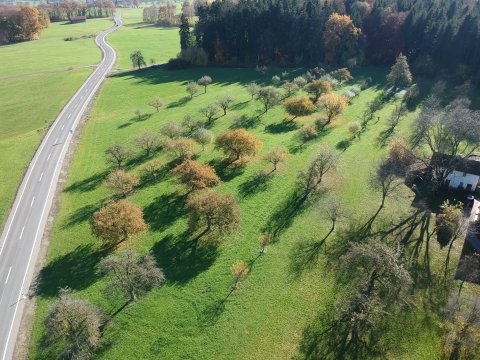EURAF congratulates Germany for the adoption of the motion as an important step for a sustainable agriculture in Germany.
On 13.01.2021, the German Bundestag approved the joint motion of the government coalition (CDU/CSU & SPD) with the support of almost all other parties to promote agroforestry (AF) with a large majority. The recorded full debate and all associated documents on can be viewed in the Bundestag media library.
This sent a clear signal to the German government to exploit the potential of AF for increased productivity, climate resilience and biodiversity. This was preceded by an intensive debate across the political parties on this form of agriculture, as a result of which several parliamentary groups submitted individual motions to promote AF in Germany.
Of central importance in the motion is the expressed will therein to create legal certainty for the establishment and management of AF systems. This is urgently needed as an important prerequisite for the increased implementation of AF in agricultural practice. Furthermore, legal certainty also creates the basis for the eligibility for payments from the Common Agricultural Policy (CAP). In this context, it is correct and of utmost importance that a promotion of the entire AF area – including the woody crops area – is considered, both via the pillar I and II of the CAP.
However, asking the federal government to implement legal recognition and promotion of AF is not enough. Now it is important to design the agricultural (promotion) legal framework in such a way that a large variety of AF practices can be undertaken. This not only makes sense from an ecological point of view, but is also necessary so that farms can individually design AF areas flexibly, adapted to the location and in line with their business objectives. In particular, with regard to the utilization aspect of AF tree species, it is necessary to ensure, that there are no restrictions on the range of species or on the number of trees within a plot. In addition, a general right of use and reversion of the woody part is essential for acceptance by farmers.
Support for AF should be provided through both pillars of the CAP. For example, the establishment of an AF area could be supported under pillar II as an investment measure and then the entire system could be supported under the first pillar as a land management method that promotes climate and environmental protection within the framework of the Eco-Schemes. The EU also considers AF to be predestined for this purpose. In any case, the legal framework for financial support must be designed in such a way that the will of many farmers to establish AF systems is not prevented by counterproductive restrictions or bureaucratic funding modalities. The fact that the German Bundestag has addressed the issue of AF shows that the great ecological and economic potential of this form of agriculture is finally being recognized at this political level. In this respect, the motion passed in January by the governing coalition is a very important step for the advancement of AF in Germany in terms of area.
More AF results in more climate adaptation, more climate protection, more soil and water protection, more biodiversity and structurally rich landscapes, but also more land productivity and positive regional economic effects. Thus, AF should be seen as an essential part of a sustainable agriculture in Germany as well.
Once again, EURAF congratulates Germany for this important motion and recognizes the important work done by the German Association for Agroforestry (DeFAF) and wishes further success in promoting AF in Germany.












